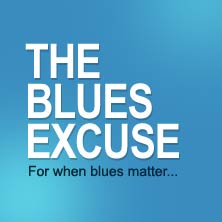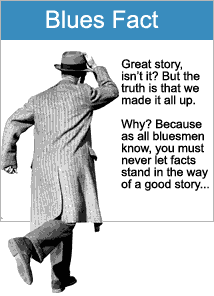The Blues Excuse draws a part of our inspiration from the
Blues Ethic
which developed around the turn of last century.
Most early blues performers were negroes. And they had big problems
getting any exposure in the USA at that time because of entrenched racism
in the music publishing business.
But in 1919, a blues performer called Crooked Leg Brown took
advantage of this situation to pull off one of the greatest scams
in blues music history.
Crooked Leg paid a drunken white cotton farmer 10c to pose for a picture,
then paid another 5c to buy a copy of the sheet music for "St Louis
Blues" (a well-known tune in Alabama at the time) which he neatly copied
onto a blank score sheet.
Then he concocted a biography for a fictitious character he named "Paul
Whiteman, King of Jazz" and shelled out another 10c for a post office
box and some stamps to mail the whole lot off to a well-known New York music
publishing house.
The idea of a Southern "King of Jazz" (handily called "Whiteman") singing
a negro blues song galvanized the music publishers and soon caught
the imagination of Americans nation-wide.
Within a short time the Whiteman cover of St Louis Blues shot to the top
of what passed for pops in those days and fat royalty cheques began filling
Crooked Leg's Alabama PO box.
By the time the whole fraud was exposed 6 months later - to the great
embarrassment of everyone involved - Crooked Leg had turned his 25c
investment into around $25,000 (a big sum in those days!) and taken
to the hills.
For many years afterwards, this wonderful scam was immortalised in the phrase
"You're a real Whiteman" (which can still be heard in many old
Hollywood films to this day).


